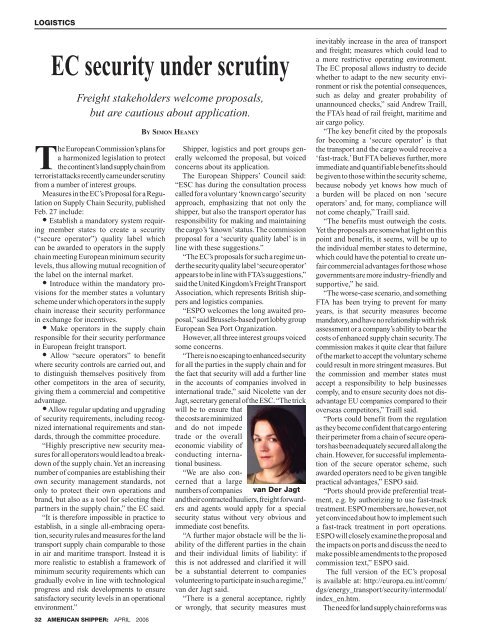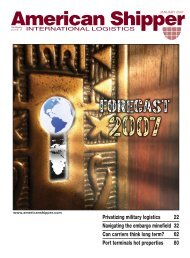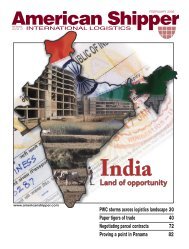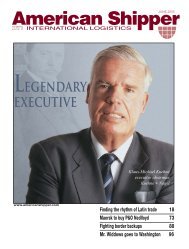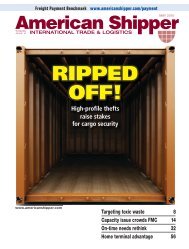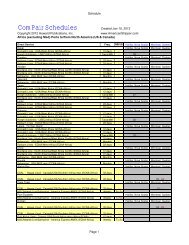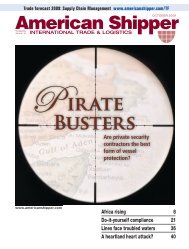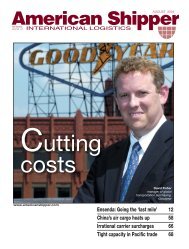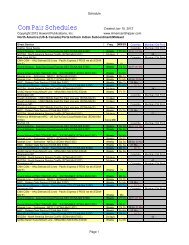McLean's - American Shipper
McLean's - American Shipper
McLean's - American Shipper
- No tags were found...
You also want an ePaper? Increase the reach of your titles
YUMPU automatically turns print PDFs into web optimized ePapers that Google loves.
LOGISTICSEC security under scrutinyFreight stakeholders welcome proposals,but are cautious about application.The European Commission’s plans fora harmonized legislation to protectthe continent’s land supply chain fromterrorist attacks recently came under scrutinyfrom a number of interest groups.Measures in the EC’s Proposal for a Regulationon Supply Chain Security, publishedFeb. 27 include:• Establish a mandatory system requiringmember states to create a security(“secure operator”) quality label whichcan be awarded to operators in the supplychain meeting European minimum securitylevels, thus allowing mutual recognition ofthe label on the internal market.• Introduce within the mandatory provisionsfor the member states a voluntaryscheme under which operators in the supplychain increase their security performancein exchange for incentives.• Make operators in the supply chainresponsible for their security performancein European freight transport.• Allow “secure operators” to benefitwhere security controls are carried out, andto distinguish themselves positively fromother competitors in the area of security,giving them a commercial and competitiveadvantage.• Allow regular updating and upgradingof security requirements, including recognizedinternational requirements and standards,through the committee procedure.“Highly prescriptive new security measuresfor all operators would lead to a breakdownof the supply chain. Yet an increasingnumber of companies are establishing theirown security management standards, notonly to protect their own operations andbrand, but also as a tool for selecting theirpartners in the supply chain,” the EC said.“It is therefore impossible in practice toestablish, in a single all-embracing operation,security rules and measures for the landtransport supply chain comparable to thosein air and maritime transport. Instead it ismore realistic to establish a framework ofminimum security requirements which cangradually evolve in line with technologicalprogress and risk developments to ensuresatisfactory security levels in an operationalenvironment.”32 AMERICAN SHIPPER: APRIL 2006BY SIMON HEANEY<strong>Shipper</strong>, logistics and port groups generallywelcomed the proposal, but voicedconcerns about its application.The European <strong>Shipper</strong>s’ Council said:“ESC has during the consultation processcalled for a voluntary ‘known cargo’ securityapproach, emphasizing that not only theshipper, but also the transport operator hasresponsibility for making and maintainingthe cargo’s ‘known’ status. The commissionproposal for a ‘security quality label’ is inline with these suggestions.”“The EC’s proposals for such a regime underthe security quality label ‘secure operator’appears to be in line with FTA’s suggestions,”said the United Kingdom’s Freight TransportAssociation, which represents British shippersand logistics companies.“ESPO welcomes the long awaited proposal,”said Brussels-based port lobby groupEuropean Sea Port Organization.However, all three interest groups voicedsome concerns.“There is no escaping to enhanced securityfor all the parties in the supply chain and forthe fact that security will add a further linein the accounts of companies involved ininternational trade,” said Nicolette van derJagt, secretary general of the ESC. “The trickwill be to ensure thatthe costs are minimizedand do not impedetrade or the overalleconomic viability ofconducting internationalbusiness.“We are also concernedthat a largenumbers of companiesvan Der Jagtand their contracted hauliers, freight forwardersand agents would apply for a specialsecurity status without very obvious andimmediate cost benefits.“A further major obstacle will be the liabilityof the different parties in the chainand their individual limits of liability: ifthis is not addressed and clarified it willbe a substantial deterrent to companiesvolunteering to participate in such a regime,”van der Jagt said.“There is a general acceptance, rightlyor wrongly, that security measures mustinevitably increase in the area of transportand freight; measures which could lead toa more restrictive operating environment.The EC proposal allows industry to decidewhether to adapt to the new security environmentor risk the potential consequences,such as delay and greater probability ofunannounced checks,” said Andrew Traill,the FTA’s head of rail freight, maritime andair cargo policy.“The key benefit cited by the proposalsfor becoming a ‘secure operator’ is thatthe transport and the cargo would receive a‘fast-track.’ But FTA believes further, moreimmediate and quantifiable benefits shouldbe given to those within the security scheme,because nobody yet knows how much ofa burden will be placed on non ‘secureoperators’ and, for many, compliance willnot come cheaply,” Traill said.“The benefits must outweigh the costs.Yet the proposals are somewhat light on thispoint and benefits, it seems, will be up tothe individual member states to determine,which could have the potential to create unfaircommercial advantages for those whosegovernments are more industry-friendly andsupportive,” he said.“The worse-case scenario, and somethingFTA has been trying to prevent for manyyears, is that security measures becomemandatory, and have no relationship with riskassessment or a company’s ability to bear thecosts of enhanced supply chain security. Thecommission makes it quite clear that failureof the market to accept the voluntary schemecould result in more stringent measures. Butthe commission and member states mustaccept a responsibility to help businessescomply, and to ensure security does not disadvantageEU companies compared to theiroverseas competitors,” Traill said.“Ports could benefit from the regulationas they become confident that cargo enteringtheir perimeter from a chain of secure operatorshas been adequately secured all along thechain. However, for successful implementationof the secure operator scheme, suchawarded operators need to be given tangiblepractical advantages,” ESPO said.“Ports should provide preferential treatment,e.g. by authorizing to use fast-tracktreatment. ESPO members are, however, notyet convinced about how to implement sucha fast-track treatment in port operations.ESPO will closely examine the proposal andthe impacts on ports and discuss the need tomake possible amendments to the proposedcommission text,” ESPO said.The full version of the EC’s proposalis available at: http://europa.eu.int/comm/dgs/energy_transport/security/intermodal/index_en.htm.The need for land supply chain reforms was


